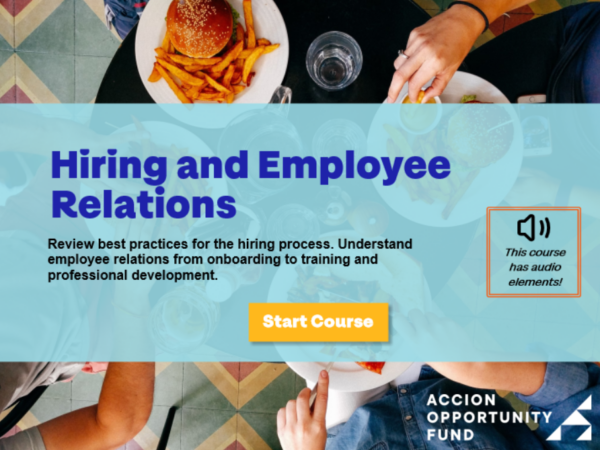First Hire, Best Hire: Hiring Your First Employee
Hiring your first employee is a significant milestone in your journey. It marks your transition from solopreneur to employer

Hiring your first employee is a significant milestone in your entrepreneurial journey. It marks a pivotal moment where you transition from solopreneur to employer, paving the way for growth and scalability in your business. However, navigating this process requires careful consideration and strategic planning to ensure that your first hire is the right fit for your team and contributes to your long-term success.
Meet the Experts
Joy M. Hutton
is the Founder of Joy of Consulting, a management consulting firm and on the go GLAM™, a beauty on demand marketplace. Joy is an advocate of entrepreneurs and small businesses and serves on a number of small business councils and has a strong commitment to working with organizations that develop female entrepreneurs. Joy was honored by the City of Houston for her leadership in entrepreneurship. February 4, 2020 was named “Joy M. Hutton” Day. In honor of this day, she launched the LeadHERship Fund, a micro grant fund for female entrepreneurs.
Debbi Kritzmanis the Senior Vice President of Talent Acquisition, People Operations & Analytics at Global Atlantic Financial Group. Debbi has over 20 years of experience leading talent initiatives and building organizations leveraging best in class hiring practices and technology. Debbi is passionate about candidate experience and client centricity.
Understanding the Importance of Your First Hire
Your first employee represents more than just an extra set of hands – they are instrumental in shaping your company culture, driving productivity, and supporting your business goals. The decision to hire your first employee is a strategic one, with far-reaching implications for your business’s trajectory and success.
The Role of Your First Employee
When considering your first hire, it’s essential to clarify the role and responsibilities they will undertake. Identify the specific tasks and functions that need to be fulfilled to support your business operations and growth objectives. Whether it’s administrative support, customer service, or specialized expertise, define the role with clarity to attract the right candidates.
The Impact of Your First Hire
Your first employee sets the tone for your company culture and work environment. They contribute to the overall morale and dynamics of your team, influencing how future hires perceive your company. Additionally, hiring your first employee can alleviate the burden of workload, allowing you to focus on strategic initiatives and business growth.
Essential Considerations Before Hiring Your First Employee
Before embarking on the hiring process
, there are several key considerations that solopreneurs should address to ensure a successful outcome.
- Defining Your Budget: Determine your budget for employee compensation, including wages, benefits, and any additional expenses associated with hiring. Assess your financial resources and set realistic expectations for the investment required to bring on your first employee.
- Understanding Employment Laws: Familiarize yourself with basic employment laws and regulations to ensure compliance throughout the hiring process and beyond. Understand your obligations as an employer regarding wages, working hours, employee rights, and anti-discrimination laws.
Qualities to Look for in Your First Employee
When evaluating potential candidates for your first hire, prioritize qualities that align with your business values and contribute to operational success.
- Adaptability and Initiative: Look for candidates who demonstrate adaptability and a proactive approach to problem-solving. Your first employee should be able to navigate ambiguity and take initiative to contribute to the growth of your business.
- Reliability and Accountability: Seek individuals who are reliable and accountable for their actions. Your first employee should be someone you can trust to fulfill their responsibilities and meet deadlines consistently.
- Cultural Fit and Team Compatibility: Assess how well candidates align with your company culture and values. Consider how they will fit within your existing team dynamics and contribute to a positive work environment.
Crafting Effective Job Descriptions
Communicating your expectations clearly in job descriptions is essential for attracting qualified candidates who are the right fit for your business.
- Clear Role Responsibilities: Outline the specific duties and responsibilities of the role, including any required qualifications or skills. Clearly define what success looks like in the position to attract candidates who are motivated to excel.
- Highlighting Growth Opportunities: Emphasize opportunities for growth and development within your company. Communicate how the role contributes to the broader goals of the business and the potential for advancement over time.
Conducting Successful Interviews
Interviews play a crucial role in identifying the right candidate for your small, growing team. Here are some practical tips for conducting effective interviews:
- Prepare a structured interview format with predefined questions to assess candidates consistently.
- Use behavioral interview questions to gauge candidates’ past experiences and problem-solving abilities.
- Pay attention to non-verbal cues and interpersonal skills during the interview to assess cultural fit and compatibility with your team.
Creating an Attractive Work Environment
To attract and retain top talent, solopreneurs should focus on creating a work environment that values transparency, collaboration, and employee growth.
Professional Development Opportunities
Offer opportunities for professional growth and skill development to demonstrate your commitment to employee success. Provide access to training programs, workshops, and mentorship opportunities to support career advancement.
Flexible Work Arrangements
Consider implementing flexible work arrangements, such as remote work options or flexible hours, to accommodate employees’ needs and preferences. Flexibility can enhance work-life balance and contribute to employee satisfaction and retention.
Fostering a Positive Company Culture
Creating a vibrant and company culture is essential for attracting and retaining top talent. A strong company culture sets the tone for how employees interact with one another, approach their work, and contribute to the overall success of the business.
- Values and Mission Alignment: Start by defining your company’s core values and mission statement. These guiding principles should reflect what your business stands for and the impact it aspires to make in the world. Communicate these values clearly to employees and integrate them into every aspect of your business operations.
- Open Communication and Transparency: Encourage open communication and transparency within your organization. Foster an environment where employees feel comfortable sharing ideas, feedback, and concerns. Transparency builds trust and empowers employees to take ownership of their work and contribute to the company’s success.
- Collaboration and Teamwork: Promote collaboration and teamwork across departments and teams. Encourage cross-functional collaboration on projects and initiatives to foster creativity, innovation, and problem-solving. Celebrate team successes and recognize individual contributions to promote a culture of appreciation and camaraderie.
- Work-Life Balance and Well-being: Prioritize employee well-being and work-life balance. Offer flexible work arrangements, such as remote work options or flexible hours, to accommodate employees’ needs and preferences. Encourage employees to prioritize self-care and take breaks when needed to prevent burnout and promote overall well-being.
- Recognition and Rewards: Recognize and reward employees for their contributions and achievements. Implement a formal recognition program to acknowledge outstanding performance, milestones, and achievements. Celebrate successes as a team and show appreciation for employees’ hard work and dedication.
- Continuous Learning and Growth: Support employees’ professional development and career growth. Offer opportunities for training, skill development, and mentorship to help employees expand their knowledge and advance their careers within the organization. Invest in employee growth to foster loyalty and long-term commitment.
Empowering Your Business Through Strategic Hiring
In conclusion, hiring your first employee is a significant step toward building a successful and sustainable business. By understanding the importance of your first hire, addressing essential considerations before hiring, and prioritizing key qualities in candidates, you can set your business up for long-term success. With careful planning, effective communication, and a commitment to creating a positive work environment, you can attract and retain top talent that propels your business forward. Remember, your first hire is not just an employee – they are a partner in your entrepreneurial journey, contributing to the growth and success of your business.









